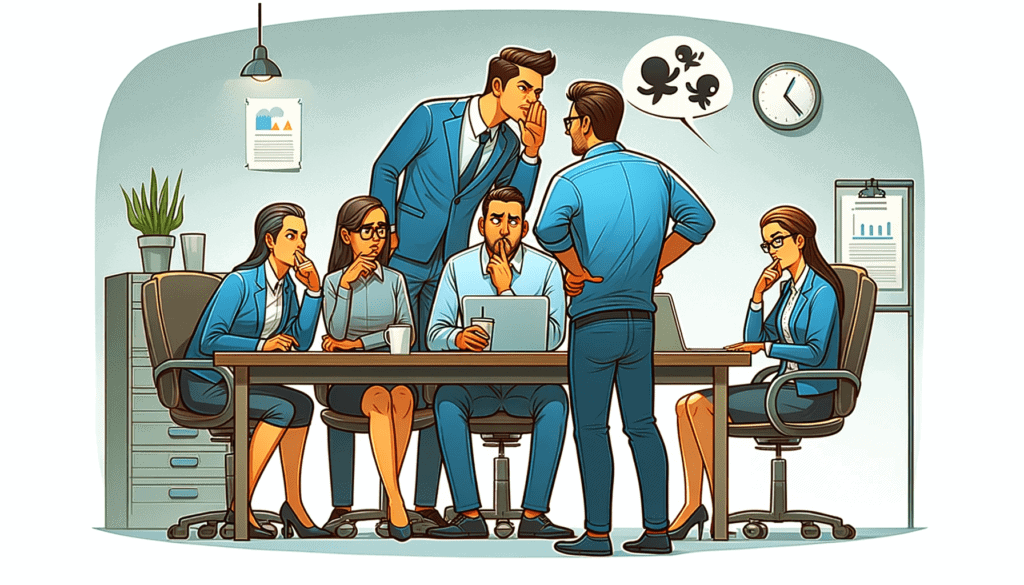Is jealousy lurking in your office corridors?
Often underestimated, jealousy in the workplace can be a silent disruptor, chipping away at team morale and productivity.

In this article, we dive into how this common yet complex emotion affects individual and team performance, and what can be done to manage it.
From subtle nonverbal cues to the impact on organizational health, we’ll cover the signs, consequences, and strategies for creating a more harmonious and effective workplace.
Key Takeaways:
- Jealousy’s Impact: Workplace jealousy leads to decreased motivation and productivity, manifesting in behaviors that can undermine team dynamics and individual performance.
- Recognizing and Addressing Signs: Key to managing jealousy is identifying signs like nonverbal cues and verbal indicators, and understanding the importance of managerial intervention to foster a supportive environment.
- Psychological and Organizational Consequences: Jealousy not only affects individual mental well-being but also has a wider organizational impact, leading to increased turnover and reduced overall productivity.
- Mitigation Strategies: Addressing workplace jealousy involves differentiating between benign and malicious envy, promoting fair recognition, and encouraging a culture of cooperation to enhance team cohesion and individual satisfaction.
Effects of Jealousy on Workplace Performance
Jealousy in the workplace can profoundly impact individual and organizational productivity.
It often leads to a decrease in motivation and can promote behaviors that actively undermine colleagues’ performance.
| Jealousy in the Workplace | Negative Effects |
|---|---|
| Decrease in motivation due to jealousy | Undermines colleague’s performance |
| Jealousy of co-worker’s achievements/relationships | Reduces individual’s own motivation |
| Internal turmoil of envy | Detracts from individual’s focus and performance |
| Perception of unfair advantage | Diminished drive to excel |
| Engaging in acts of sabotage (e.g., spreading rumors, withholding information) | Decreases team’s efficiency and success |
| Creating a poor work environment | Leads to increased staff turnover, reduced engagement, and lower organizational productivity |
Jealousy and Its Toll on Productivity and Motivation
Jealousy acts as a psychological barrier to productivity.
When an employee feels jealous of a co-worker’s achievements or relationships, it can lead to a decrease in their own motivation.
The internal turmoil of envy consumes mental bandwidth, detracting from an individual’s ability to focus on their tasks and goals, thereby reducing their overall performance.
Studies, such as those highlighted by ResearchGate, have demonstrated the complex effects of jealousy that sometimes result in a worker’s diminished drive to excel if they perceive the target of their jealousy as unfairly advantaged.
Connections Between Jealousy and Workplace Sabotage
Jealousy is a common precursor to acts of sabotage within teams.

A team member who feels overshadowed may engage in subtle forms of undercutting colleagues, such as spreading rumors, withholding crucial information, or disrupting teamwork – all of which can deal serious blows to the team’s efficiency and success.
The Harvard Business Review has explored how these negative emotions can incline individuals towards behaviors that are not in the best interest of the organization.
The Ripple Effect of Jealousy on Organizational Performance
Jealousy does not only hurt those directly involved, but can also have a ripple effect, impacting the wider organizational performance.
A poor work environment fraught with jealousy may lead to increased staff turnover, reduced employee engagement, and ultimately a fall in the organization’s productive output.
Resources often must be redirected to manage interpersonal conflicts, which could otherwise be used to foster growth and innovation within the company.
As supported by the Academy of Management Review, the organizational environment can both moderate and exacerbate the effects of jealousy, making it essential for management to carefully consider how they structure and manage their teams.
Identifying Jealousy in the Workplace
In a professional environment, it’s crucial to identify and understand jealousy as it can significantly hinder workplace dynamics and employee well-being.
Common Signs of Jealousy Among Coworkers
Jealousy in the workplace can manifest through various behaviors and actions.
Employees may notice that a jealous coworker often tries to undermine others’ achievements or spread unfounded rumors.
Another common sign is reluctance to collaborate or assist colleagues, reflecting the individual’s inner turmoil over someone else’s success.
- Nonverbal Cues: Excessive eye-rolling, avoiding eye contact, or dismissive gestures.
- Verbal Indicators: Sarcasm about a colleague’s accomplishments, or hypercritical feedback.
- Work Interference: Attempts to sabotage another’s work or taking credit for others’ ideas.
The Impact of Jealousy on Personal and Team Dynamics
When jealousy arises, it doesn’t just affect those involved; it can ripple through an entire team.
Personal dynamics can sour, leading to an uncomfortable work environment where trust and collaboration are compromised.
Teams may find themselves divided, with productivity and morale plummeting as a result.
- Trust Erosion: A jealous colleague may be distrusted, causing a breakdown in team cohesion.
- Motivation Decline: Pervasive jealousy can demotivate employees and lead to a lack of engagement.
Manager’s Role in Recognizing and Addressing Jealousy
Managers play a pivotal role in addressing jealousy in the workplace.
They should be adept at spotting the signs of jealousy and take immediate action to prevent escalation.
Initiating open dialogues and promoting a culture of transparency can help mitigate feelings of envy.
Leadership must demonstrate fairness in recognition and opportunities to ensure a sense of equity.
- Observation: Managers should monitor team interactions for signs of jealousy.
- Intervention: Timely and effective intervention by the manager can prevent the negative spread of jealousy.
By identifying the signs of jealousy and understanding its impact, both coworkers and managers can contribute to a healthier, more supportive work environment.
Understanding Workplace Jealousy
Workplace jealousy is a complex emotion rooted in the fear of losing something valuable to a perceived rival.
Profoundly influencing the social dynamics within organizations, it has the potential to both motivate and undermine a workforce.
The Psychology Behind Jealousy and Envy
Psychologists differentiate between jealousy and envy at work, suggesting that jealousy involves fear of loss due to a rival, while envy is a reaction to someone else possessing a desirable attribute or achievement.
They are connected to various emotions such as insecurity or a lack of self-esteem.
Factors like personal disposition and organizational culture can also heighten the propensity for such feelings.
Distinguishing Between Benign and Malicious Envy
Benign envy can lead to positive outcomes, inspiring individuals to improve their own status or abilities.

Conversely, malicious envy is destructive and may result in harming the envied person’s reputation or standing.
Distinguishing between the two is crucial for addressing the emotion constructively.
Social Comparison Theory and Its Implications
Social Comparison Theory posits that individuals determine their own social and personal worth based on how they stack up against others, which is particularly relevant in the workplace.
Culture can influence the manner and extent to which employees engage in comparison, engendering feelings of envy or jealousy when disparities become apparent.
This can lead to negative implications for both personal well-being and organizational health.
Tackling Jealousy and Fostering a Supportive Culture
Workplace jealousy can undermine team dynamics and individual performance.
Addressing this issue is crucial for creating a supportive environment where everyone can thrive.
Strategies for Overcoming Jealousy and Building Confidence
To combat jealousy in the workplace, it is important to focus on self-improvement and peer support.
Employees should be encouraged to set personal goals and celebrate their own milestones as well as those of their colleagues.
SHRM suggests hiring individuals who display emotional maturity and confidence, which contributes to a resilient and supportive team culture.
- Self-assessment: Employees can reflect on their strengths and areas for growth.
- Mentorship programs: These can provide support and facilitate skills development.
Leadership’s Role in Promoting Fairness and Recognition
Leaders play a pivotal role in mitigating jealousy by creating an atmosphere of fairness and recognition.
They should ensure that accomplishments are acknowledged equitably and that all team members feel valued.
- Transparent communication: Keeping everyone informed about decision-making processes.
- Regular feedback: Offering constructive critiques alongside recognition of achievements.
Encouraging Cooperation Over Competition
Promoting a culture where cooperation is valued over competition can decrease feelings of jealousy.
When collaboration is emphasized, respect and helping others become the foundation of the workplace ethos.
- Team-building activities: These can nurture trust and collaborative skills.
- Shared goals: Aligning individual objectives with team outcomes encourages unity.
Conclusion
In wrapping up, we’ve seen how jealousy in the workplace, often underestimated, can significantly disrupt team dynamics and productivity.
From recognizing its subtle signs to understanding its deep psychological impacts, managing jealousy is crucial for a healthy work environment.

Effective strategies, including promoting fairness and fostering a culture of cooperation, are key to mitigating its effects.
Let’s keep this in mind: a supportive, jealousy-free workplace isn’t just an ideal, it’s an achievable goal.
Share your experiences or thoughts on tackling workplace jealousy, and let’s collectively strive for a more harmonious and productive professional world.

Daniel Boyce, founder of AwareRecruiter.com, brings a diverse background in health, fitness, sales, and recruitment to career development. He’s passionate about helping professionals overcome workplace challenges and succeed in new roles. Daniel’s vision for AwareRecruiter.com is to create a comprehensive resource for career growth and satisfaction.
